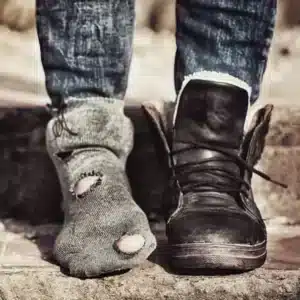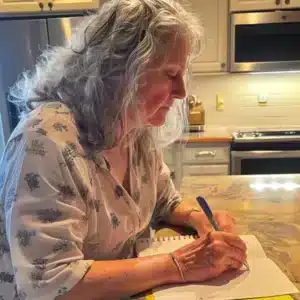We started talking about the trip the night we watched the neighbor’s porch light go out and the ocean documentary stay on long after we’d meant to go to bed. Denise kept her feet tucked under my thigh on the couch like she always has, and when the narrator said something about the “restless Pacific,” she murmured, “Forty years,” like she was telling the ocean a secret.
We’d raised four kids, balanced checkbooks across the kitchen table, eaten more casseroles than I care to count, and learned how to argue without making anything break. When our youngest moved out, we stood in the quiet and looked at each other like two people who had been pulling the same wagon for decades and finally got to stand still. We’d planned this trip in scraps—menus torn from magazines, a postcard with a lighthouse on it stuck behind our calendar, a list on the fridge labeled “Oregon Dreams”: morning coffee, tide pools, windbreakers, no schedules, no one to tuck in.
The inn was a place you could smell before you could see it in the photos—wood smoke, salt, butter from a bakery in town. Small rooms with blankets you could actually feel the weight of, a balcony that faced a stubborn slab of coastline. We made the reservation a year out, not because we had to but because it felt like a way of telling ourselves we meant it.
Then Amanda found out.
She came over with the girls on a Tuesday, a whirlwind of dry Cheerios and sticky hands. Our cat, an elderly tabby named Rufus, slid under the couch in a practiced move. Denise had made stew. I’d set the table the way I like it, placemats straight, forks on the left, folded napkins like little tents. Amanda set her phone face down and said, “Oregon, huh?” with that sharp little smile of hers that belongs to debate teams and courtrooms.
Denise and I looked at each other. The look said: here we go.
“It sounds amazing,” she said. “Rugged coast, moody skies, whole vibe. You know what else would be amazing? The girls seeing starfish. Mason jars with beach glass. A family trip.”
“Sweetheart,” Denise said, kind but firm. “This one’s for us. We’re going to be boring and romantic and probably fall asleep at nine.”
Amanda blinked. “You’re not taking us?”
Her five-year-old had Rufus cornered and was trying to bargain with him for pets. The two-year-old was drumming on her high chair with a spoon and the relentless commitment of a marching band.
“This is a couples’ thing,” Denise said. “We want to read and hold hands and listen to waves. We want to remember how to talk without someone needing a yogurt opened.”
“You always say family comes first,” Amanda said, and I watched her line up the words like dominoes. “So what is this, then?”
She didn’t stop. Over meat and potatoes, she sighed heavily about daycare costs and how expensive “experiences” are for kids. She wanted us to know about a budget resort in Florida she’d researched—lazy river, kids’ club, a breakfast buffet where the pancakes were shaped like cartoon characters. Her eyes got big at the right parts. Denise’s mouth softened the way it does when she starts picturing our granddaughters in sun hats.
I let it go for the night. I wanted to see if we were going to hold the line.
Amanda called the next day. And the next. She let herself in one afternoon while we were trimming the rosebush, and her girls tumbled out of the SUV with graham crackers and hair barrettes in their fists. “Mom,” she said, “we found a package deal. Flights are insane right now. If we book together, we could—”
“We want a small place,” I said. “Minus the wristbands.”
She slipped right past that. “You never did a big family trip when we were kids. Remember, we camped at state parks and called it an adventure. I’m just asking for once. And it would be a great story: Nana and Papa’s 40th with the whole gang.”
When she puts her hand on Denise’s arm and tilts her head, she looks exactly like the girl who argued down her high school principal about the dress code. I fell for that more times than I should have when she was a teenager. Denise has always had a soft spot for the loudest bird in the nest.
“They’re tired,” Denise said later, after we’d put away the gardening tools. “She’s right about that. Two little ones is no joke.”
“What about what we said we wanted?” I asked. “We talked about quiet like it was a kind of medicine. Remember?”
“Maybe we could have both,” she said, and I heard the wobble in it. “Maybe we could get up early and sit on the balcony with coffee before the chaos. Maybe the girls could nap and we could… you know… nap.”
We let the conversation be for a few days, and in that space, I realized how long Denise and I had been choosing the version that kept everyone else content. It’s not martyrdom; it’s a habit, like closing the cabinets all the way or making sure there’s gas in the car for whoever drives it next. It becomes part of your personality. We said yes.
We told Amanda we’d foot the bill for the room and the kids’ extras if she and Sean would cover their flights. Denise called the inn and canceled with an apology that sounded like regret turned into words. I booked the suite at a resort that had a water slide shaped like a pirate ship. I clicked “confirm” and felt like I’d just agreed to something I hadn’t read in the fine print.
The fine print showed up in the form of text messages.
Make sure to bring snacks for the kids—they’re particular.
You guys can do bedtime Wednesday and Thursday? We want to check out the night scene.
We’re doing the spa on Tuesday—nice thing since you’ll be there to hang with the girls! Bonding!
And my favorite: Can you pack some extra sunscreen? Ours is weird on their skin. Also, do you think you could swap our flights to leave later? Mornings are rough.
The last text came two nights before we left, when I was sitting with the suitcase open on our bed. I had two sweaters folded, a paperback, the bottle of wine I’d been saving since the spring. Denise walked in with a handful of socks and a face that said she could see the picture getting uglier.
“Amanda wants us to do three or four nights of bedtime,” she said. “She ‘really needs to blow off steam with Sean.’”
I put the paperback down carefully, the way you handle something you’re afraid might break. “We’re not going,” I said. It came out so clean and sure I almost looked around to see who had said it for me.
Denise raised an eyebrow. “Not going where?”
“To Florida,” I said. “We are not going to Florida.”
She sat on the edge of the bed, half-annoyed, half-amused. “Well. You’re certainly making statements tonight.”
I called the airline in the morning while she was out getting milk and stamps. The agent sounded young enough to be one of mine. When I told him I wanted to change our destination back to Oregon, he said, “Good call,” in a way that made me think he’d had this conversation before with other grandfathers.
The innkeeper answered on the second ring, and when I said our names she said, “Oh! You’re the couple with the note about celebrating with chocolate cake and a view of Haystack Rock. We saved your original dates for a week, just in case.”
“Do you have our room?” I asked, heart doing a thing it hadn’t done since the first time Denise took off her shoes under a table so she could dance longer.
“We do,” she said. “We’ll put wood in the basket by the fireplace.”
I must have thanked her four times. When Denise came home with her purse full of coupons, I made her sit down.
“I changed our tickets,” I said. “And our reservation. We’re going to Oregon.”
She stared. Her mouth did a little open-close thing like a fish. Then she put her hand over her lips and started laughing in the way she cries, shoulders shaking, breathing going funny. “You sneaky old man,” she said when she could. “Look at you.”
“Look at us,” I said.
I called Amanda from the gate the next morning. The airport was humming—people in flip-flops and straw hats heading toward the sun, men in suits with rolling bags and faces already in meetings.
“Hey,” she said, breathless. “Sean’s freaking out about the boarding groups. Where are you guys?”
“We’re at our gate,” I said. “But not for Florida.”
Silence. I could hear one of the girls in the background, the high sweet whine of a child being told “not now.”
“What do you mean?” she said.
“We’re going to Oregon. The original plan.”
“You’re kidding.”
“I’m not. We love you. We love the girls. But this is our trip. We forgot that for a minute. We remembered.”
The sound she made wasn’t quite a scoff. It was softer, more wounded. “So you’re abandoning us?”
“No,” I said. “We never agreed to be childcare. We agreed to an idea of a trip that turned into a job. I’m sorry we let it get that far. I’m not sorry we pulled back.”
“You’re selfish,” she said. “I can’t even believe you right now. We can’t afford help this late. Do you care about your grandchildren at all?”
“I care enough to be their example,” I said, and surprised myself with that, too. “I care enough to show them that loving your family and loving your spouse are not opposite corners. You’ll figure it out.”
She hung up on me. I put my phone away and Denise squeezed my hand hard enough to hurt. “We’re really doing it,” she said, and I could hear the twenty-six-year-old version of her inside it, the one who married me in a dress she sewed herself with sleeves she ripped off at the reception because she wanted to dance.
Oregon was everything that had lived on our refrigerator list and a thousand things that hadn’t made it onto paper. We woke to fog so thick the world felt like a secret and went to sleep with the fireplace popping like it was applause. We stood with our shoes off at low tide and watched anemones open like small green fireworks, and Denise stuck her finger in one and startled, and then we did it again like kids who aren’t supposed to touch the exhibit. We drank coffee with our foreheads touching because we could hear ourselves think again. We read aloud. I put my book down to watch her read, the way she moves her lips a little when she gets to a part she loves.
We drove into town one day and split a bowl of chowder so rich I wanted to apologize to my cardiologist, and we bought a loaf of bread still warm enough to fog the bag. The innkeeper sent up the chocolate cake we’d asked for on the first night with “40” piped in careful cursive, and I took a picture of Denise pretending to blow out candles that weren’t there. She kissed me across the table and said, “Thank you for choosing us,” and I told her, “I have since 1985.”
We didn’t talk about Florida until the last night, when we were sitting with our feet on the balcony railing in matching socks we had bought in a shop that also sold kites. Denise’s phone buzzed on the table.
“Frank says they went anyway,” she said, reading the text. “He says it was… educational.”
Later, I saw Sean’s Facebook post. It was one of those vague little barbs people throw when they want to be brave and also be liked. “Some people choose ocean views over family,” he wrote over a picture of a pool with palm trees that looked like they’d been installed yesterday. The comments were a mess of people saying “you do you” with little biceps emojis.
Amanda didn’t call for a week. When she did, she sounded tired in a different way. Less entitled. More human.
“Florida was hard,” she said flatly. “The girls didn’t sleep. The sunscreen we bought made them sticky. We spent $23 on chicken fingers and they ate two. Sean and I… we didn’t really get the ‘nightlife.’ We were asleep by nine.”
“I’m sorry,” I said, and I was. I don’t root for my daughter to struggle.
“It’s just… this stage is… a lot,” she said. “I think I forgot you and Mom did it without… help.”
“We had help,” I said. “Not always the way you wanted it. But people fed us and drove us when the car wouldn’t start and fixed the sink. We were younger then. Our bones bounced. But we also learned to say no.”
There was a long pause. “I don’t like it when you say no,” she confessed.
“No one does,” I said. “That’s why it’s important.”
She laughed a little, and I heard the girl who used to climb onto my lap with a stack of picture books and order me to read the one about the moon twice. “Next time, can I ask you and Mom to watch the girls for one night so Sean and I can have a date? And if you say no, I’ll… figure it out.”
“That sounds like a plan,” I said. “Not a trap.”
We didn’t do a big post-trip summit as a family. We didn’t stand anyone in the corner or give speeches about boundaries. But something shifted. When Amanda asked for help in the months that followed, she didn’t present it as a foregone conclusion. She phrased it like a question and left room for us to answer. We said yes sometimes. We said no without three paragraphs of apology sometimes, too. She did more station wagon math and less guilt math. We saw the Florida photos—the girls grinning with hair stuck to their foreheads, a plastic bucket full of shells that were probably there yesterday and would be sand tomorrow. We clicked “like” and meant it.
On our porch in the evenings now, Denise leans into me and says, “Remember the fog?” I do. I remember a particular gull that looked personally offended by us and a couple in bright jackets who kept taking selfies and arguing about whether the lighthouse looked better from “this angle” or “this angle.” I remember that the quiet between us wasn’t empty; it was full. Full of a house we built and jobs we did and mistakes we survived and babies we bounced at 2 a.m. without throwing them at each other. Full of the kind of love you grow by showing up.
I thought the milestone would be a trip. It turned out to be a lesson I had to learn after forty years: you can be a good parent and still choose your marriage on purpose. You can be a generous grandparent and still say no to a week of unpaid work dressed up as family fun. You can love your people and also love the life you built with the person who put up with you leaving the cabinet doors open for decades.
On the last morning in Oregon, we stood on the cliff path and watched the waves do what they’ve been doing since long before we were here: arriving, receding, arriving again. Denise slipped her hand into mine and said, “I feel like us,” and I told her, “That’s the point.” We walked back to the inn without hurrying, and for the first time in a long time, I didn’t feel like we were stealing time from anything. It was ours already.





